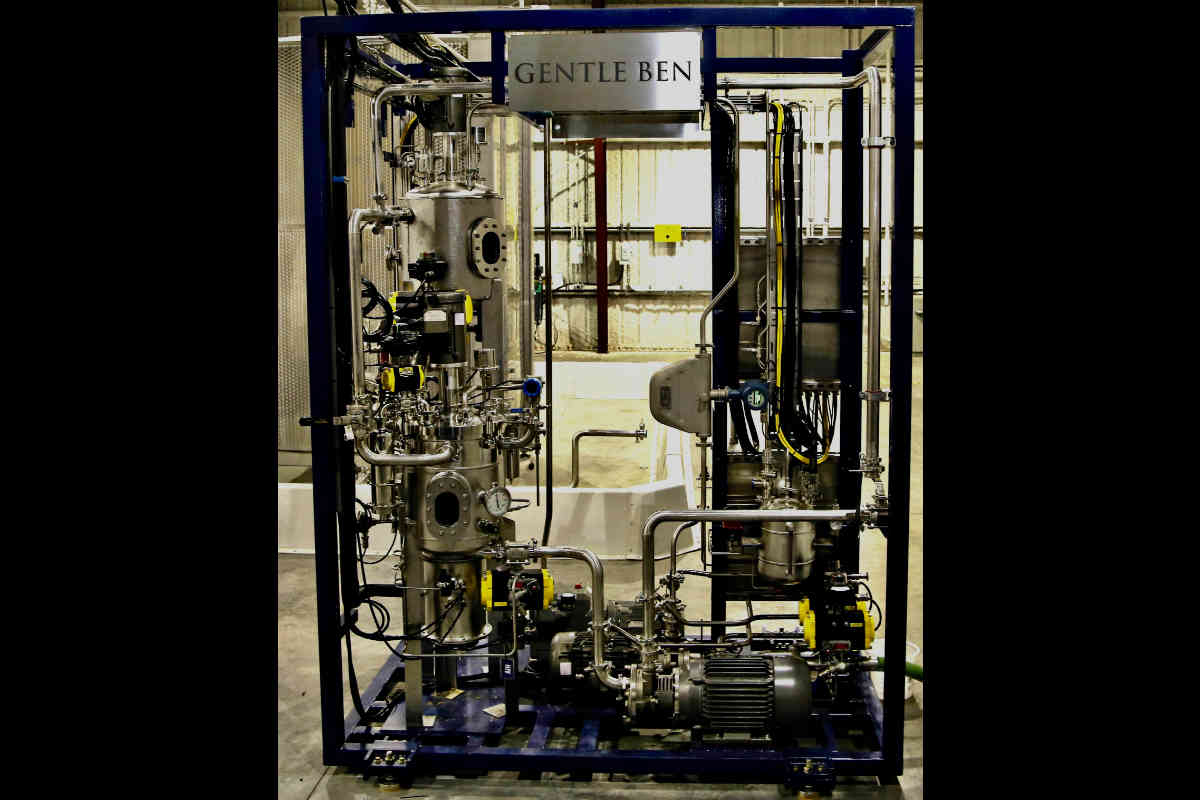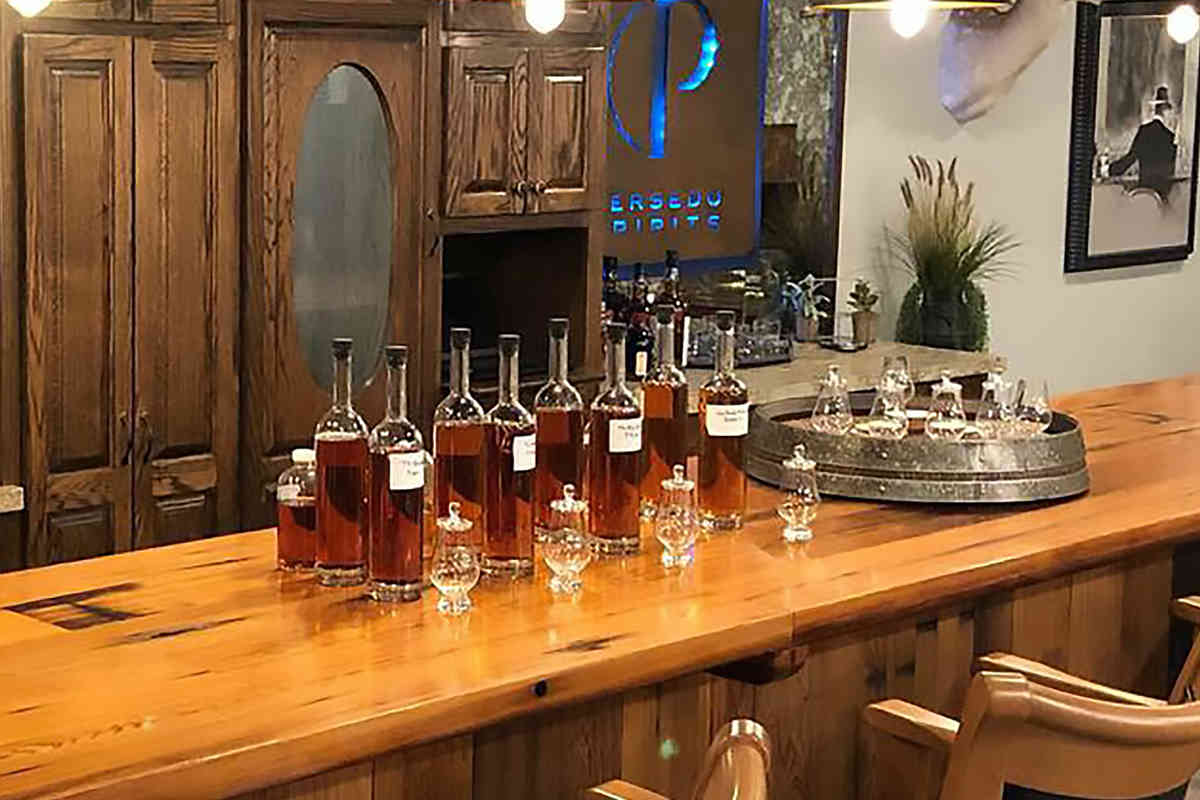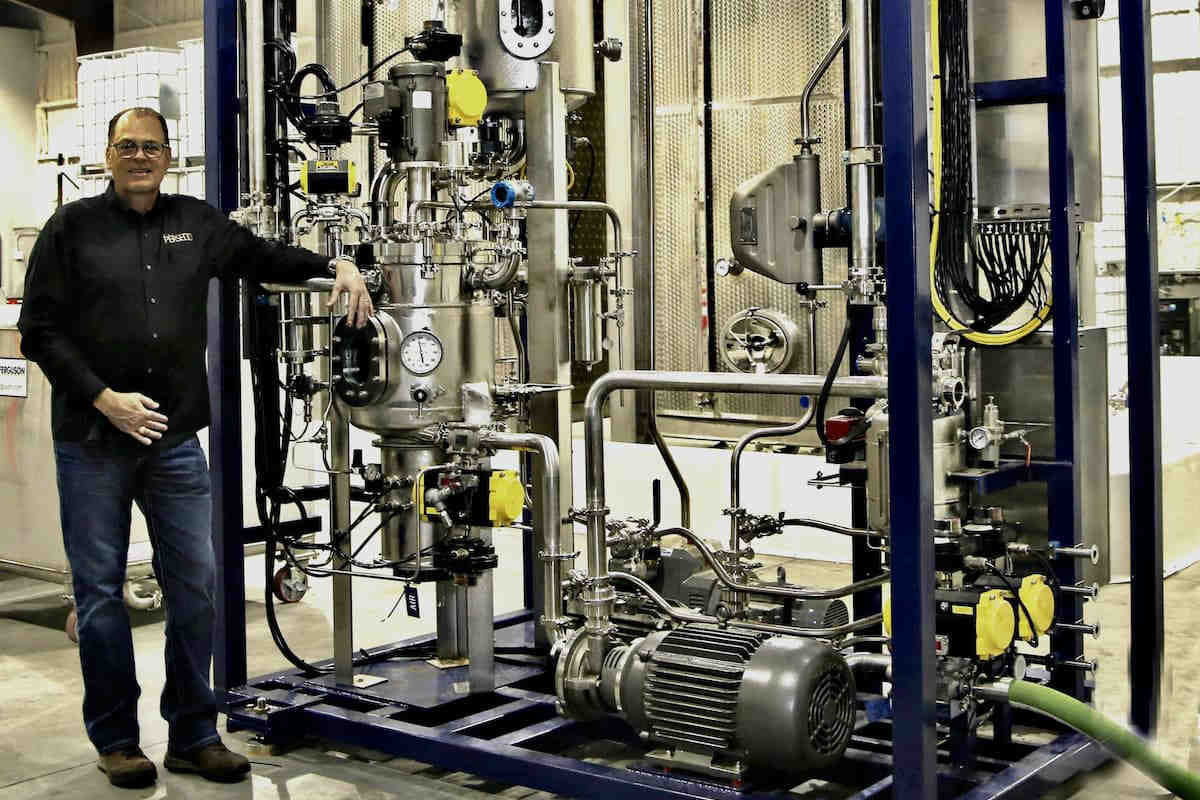Ricky Ford was googling one night. “I think it was Latin, but don’t quote me on that. ‘Per’ came back as ‘very,’ and ‘sedo’ came back as ‘smooth.’ So I just called it Persedo.”
That’s the man behind Persedo Polishing Technology explaining how his invention got its name. But that maybe-Latin phrase could just as easily summarize the tech itself. Ford’s machine takes spirits that are harsh or not-yet-ready-for-primetime and “polishes” them by removing their disagreeable components or by highlighting elements that might otherwise go undetected.
The Origins
Ford has a background in valve manufacturing and has spent his entire career in the oil and gas industry. But the seed of what would become Persedo was planted by Ford’s father, who created an air stripping machine that he used to smooth out distilled spirits.
In 1998 Ford asked Dr. Benjamin Mosier, a chemist at Texas A&M, to analyze spirits before and after they were treated with the air stripping machine to identify which compounds were removed and how their absence affected flavor and aroma.
“He came back and said you’re removing some of the things that give distilled spirits a harsh edge, some of the methanol, butanol, propanol, aldehyde, acetyls, etc. But you’re losing 10 percent of your alcohol when you do it,” Ford says.
Ford began working with his father to see if they could create technology that would remove those same compounds without inflicting their own version of angel’s share. The death of Ford’s father in 2001 put the project on hold, but Mosier reconnected with Ford in 2007 to see if the project could be completed. Ford had just sold his business and was eager to pick up where they’d left off.
“The whole objective was to take a neutral grain spirit and try to strip out some of the trace contaminants that would lead to a harsh edge in a vodka,” Ford says.
Launching Persedo
The project was successful, and in 2013 Ford filed for patent protection. But Ford hoped to use the technology for polishing more than just vodka. By switching from nitrogen to CO2 for the system’s gas he found that the tech could be used on aged spirits, too.
“We learned that we got a completely different effect when we switched, and that effect got us going down the road of esterification of some of the fatty acids that you would find in whiskeys and rums and tequilas,” says Ford. “So we were able to take some of those components that were cheesy in sweaty, fatty acids and convert those over to more of a subtle flavor and aroma ester.”
Patent work concluded in 2015, and afterward Ford established a facility and tasting room in Alvin, Texas. It houses the first of his polishing machines, named “Gentle Ben” in honor of the now-retired, 93-year-old chemist, and two more machines are on the way. The machine—which is capable of polishing up to 1,000 gallons of alcohol in eight hours—began operating in the summer of 2019. Ford’s current business plan is two-fold.
“Number one, we bring in a distiller’s product, maybe a young whiskey that just kind of needs the edge taken off. We can do that and flip it back to them,” he says. “And if they’re large enough to warrant their own machine where we could just shoehorn that into their production facility, that gives them another tool to create a completely different taste profile. They may continue to make what they make today, but we can take something that they make today and knock the edge off of it and kind of re-rack it and give them a new brand on the shelf or give them something to blend with.”

Gentle Ben “polishes” spirits at Persedo
How It Works
While the air stripping machine created by Ford’s father laid the foundations for Persedo, the present polishing process is more advanced and able to highlight certain compounds.
“It’s completely different today. Before it was just the air stripping… today we have several parameters that we dial in, including ultrasound, temperature, vacuum, flow rates of gases, and bubble size,” says Ford. “So we control those things and we create an environment whereby certain things will jump out of that solution that would normally not. These are things that have been co-distilled over and are still in the distilled spirit, and we’re able to jump in there and grab ’em.”
In Ford’s telling, the compounds that are removed from the spirit won’t be missed.
We ain’t replacing the barrel, we’ve got to have the barrel.
“Fusel-tasting alcohols like amyl alcohol or butyl alcohol or harsh acetyls, these things in my opinion get in the way of the underlying distillate. These are the inferior alcohols that give pa pa’s whiskey the rough edge. Or give a young whiskey a kind of a bitterness or an edgy feel to it. And they’re very astringent on the palate, so you don’t get a smooth, creamy finish. You get a very astringent feeling like you washed your mouth out with Scope. A lot of those things we’re able to fix or convert some of those compounds into more palatable products. And, by the way, this is not anything new to the world. This esterification process does happen in the barrel, it just happens over a long period of time.”
But Ford doesn’t want Persedo to be perceived as a barrel alternative. Instead, he sees it as another tool.
“We ain’t replacing the barrel, we’ve got to have the barrel. There’s nothing in my technology that imparts wood character. Nothing. So we’re not replacing the barrel, we’re not replacing distillation, we’re just trying to give them another tool to work with,” he says.
It seems inevitable that some may critique Persedo as a “shortcut.” When asked about this line of criticism Ford is quick with a laugh and a counter.
“You hear ‘This is just the way we do it and we’ve been doing it forever,’ but nobody comes to see me on a horse. They always drive a car.”
Providing an Alternative
Ford goes on to compare Persedo with the myriad other ways distillers seek to improve their product.
“There’s technologies out there… for example, every vodka manufacturer starts with a neutral grain spirit and they perform additional distillation steps on it. If you’re going to make a decent vodka, you would run that through distillation and try to clean it up a little bit more and then run it through some sort of charcoal filtration… and in that process, most people are going to lose 20 percent-plus of the product. So you put 1,000 gallons in to get 800 out. We do the same thing, and we take it to a purity point beyond what they can get in distillation. And we have zero alcohol loss. So you know it’s a different way, but I’m not sure I’d call it a ‘shortcut.’ I think we try and stay away from anything like rapid aging, which is a negative word in the industry, but everyone that we’re talking to is open arms for anything that helps them put a better product on the shelf,” Ford says.
In particular, Ford sees Persedo as an aid to craft distillers that don’t have the capital required to sit on aged spirits without a revenue source.
“Making a distilled spirit as you know is just not easy. A lot of the big boys, they’ve got it down and they can hammer it out with no problem. But from a craft perspective, man, it’s not easy. You go to that barrel, and you’re going to pull something out and it’s not ready. You need something on the shelf. We feel like we just give them another tool in the toolbox to maybe get it out of that barrel a little quicker.”

Persedo Spirits Tasting Room
Control vs. Polished
I had the chance to experience the before-and-after effects of Persedo myself in the form of a vodka and bourbon sent from the company. Each spirit was split between two flasks, one marked “control” and the other “polished.”
Just a whiff of the control vodka took me back to the very worst of college. It was hot, acetone-heavy, and astringent to the point of sickly sweetness—I could imagine it sitting in a plastic jug on any liquor store’s bottom shelf.
In contrast, the polished version of this dorm room menace was much softer and rounder. It still proved somewhat hot and astringent at the back, but there was no denying that its harshness had been significantly tempered. I wasn’t about to sit in a leather armchair and savor it in a snifter glass, but the vodka was now palatable where its unpolished version had been offensive.
The whole objective was to take a neutral grain spirit and try to strip out some of the trace contaminants that would lead to a harsh edge in a vodka.
While I’d never want to drink the control vodka outside of this test, there was nothing offensive about the control bourbon. It featured vanilla, caramel, and some big barrel notes and straw on the palate before fading into a hot but not particularly deep finish. If anything, it felt like a passable bourbon that you’d share with friends on a camping trip but not seek out on a whiskey list.
The polished bourbon was certainly smoother, which still featured the vanilla notes but tamped down the spice and some of the bigger barrel flavors. I found that I actually preferred the control, which seemed more characterful thanks to its spice notes and featured more of a body that could be chewed over.
During my conversation with Ford, I mentioned my preference for the un-polished bourbon. Ford mentioned that the process could be “dialed down” to have less of an effect on the spirit but stated that Persedo’s intended demographic may be those who are looking for an overall smoother experience.
“All I can say is that we have had hundreds of tasters come through here and the story is so consistent. These are average Joes, not professional tasters. But that’s my audience. My audience is the lady out there saying “I just can’t drink whiskey. It just doesn’t taste right.” And I say, what whiskey do you drink? ‘Well, I’ve been trying that Woodford Reserve or whatever. And I’ll give ‘em a before and after. And the feedback is consistent every time. ‘I can drink that. I can drink that.’”
Persedo’s three polishing machines will be fully operational by the first quarter of 2020, and Ford indicates that a number of clients (which can’t be disclosed at this time) have already signed on. With any luck, the hypothetical drinker cited above will soon be part of a chorus.



